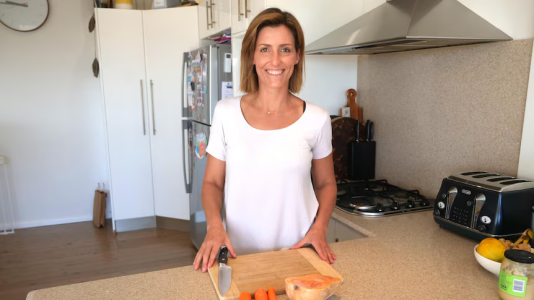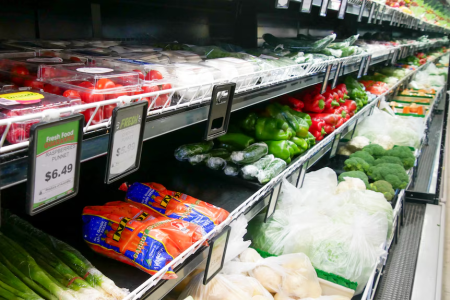Family uses artificial intelligence for meal plans to cut grocery bill
By
ABC News
- Replies 3
Brooke Ferrier admittedly never paid much attention to her weekly grocery bill.
But sticking to a budget became a reality for the New South Wales Central Coast mother of two when she and her husband both lost their jobs.
"There was a lot going on in my personal life and I really didn't have the capacity to think about what to cook," Ms Ferrier recalled.
"I thought I'd turn to AI [artificial intelligence] and see if it could help me out in terms of creating a bit of a meal plan on a budget."
She asked ChatGPT for a low-cost meal plan for two adults and two toddlers and followed up with extra instructions (known as prompts in the AI world) to fine-tune the result, including a request for hidden vegetables, low-carb options and no lentils, to meet the family's preferences.
The AI also compared supermarket prices and created a categorised shopping list with specific quantities.
The result was a week's worth of breakfasts, dinners and snacks coming in at a total of $140.
It was a drastic difference to the way Ms Ferrier used to shop.
"[Previously] I'd get a range of different meats, a whole bunch of veggies and fruit and our pantry and our fridge were stocked but I was spending $400 or $500 every four or five days," she said.
"Each night I was making what came to mind looking into the fridge, no thought or planning to what we were eating.
"I was always over cooking and always throwing out waste.
"With this, I was literally only buying what I needed … I was saving so much money."
Ms Ferrier said she was now making meals go further.
"I had been one to buy things out of ease, to feed the kids, things like processed snacks," she said.
"[But] when I cook there are always leftovers … a lot of the meals can serve as snacks later … [things like] fritters, pancakes, sausage rolls.
"One week, I typed in that we'd been feeling sick and wanted foods that are meant to boost immunity."
She has also asked AI for recipes to use up pantry items that have been in the cupboard for a long time, like tinned tomatoes and coconut milk.
"I would add some prompts around things like making sure I had enough fibre according to the Australian Dietary Guidelines," Dr Beckett advised.
"To make sure we're not just eating frugally but we're also eating well and nourishing ourselves."
Dr Beckett said one of the reasons an AI meal plan or shopping list could save money was because it removed human emotion.
"It's taking the thinking about what you have and what you need out of your hands," she said.
"It means you don't need to make those decisions because we are emotional in the supermarket, and the supermarkets rely on that."
Ms Ferrier agreed that AI helped ensure she was only buying what she needed.
"We've gone from a fridge full of food all the time, to the bare minimum," she said.
"In the past, we were constantly throwing out quite a bit … we always had a lot of waste."
Ms Ferrier and her husband have both found new jobs but plan to continue using AI to help keep the budget in check.
As for the weekly savings?
"That will probably go back into the kids somehow on clothes or toys," Ms Ferrier said.
"But we're also planning to renovate so we're looking to tighten our budget however we can."
By Sarah Forster
But sticking to a budget became a reality for the New South Wales Central Coast mother of two when she and her husband both lost their jobs.
"There was a lot going on in my personal life and I really didn't have the capacity to think about what to cook," Ms Ferrier recalled.
"I thought I'd turn to AI [artificial intelligence] and see if it could help me out in terms of creating a bit of a meal plan on a budget."
She asked ChatGPT for a low-cost meal plan for two adults and two toddlers and followed up with extra instructions (known as prompts in the AI world) to fine-tune the result, including a request for hidden vegetables, low-carb options and no lentils, to meet the family's preferences.
The AI also compared supermarket prices and created a categorised shopping list with specific quantities.
The result was a week's worth of breakfasts, dinners and snacks coming in at a total of $140.
It was a drastic difference to the way Ms Ferrier used to shop.
"[Previously] I'd get a range of different meats, a whole bunch of veggies and fruit and our pantry and our fridge were stocked but I was spending $400 or $500 every four or five days," she said.
"Each night I was making what came to mind looking into the fridge, no thought or planning to what we were eating.
"I was always over cooking and always throwing out waste.
"With this, I was literally only buying what I needed … I was saving so much money."
Back to basics
The family's weekly meal plans include spaghetti bolognese with hidden veggies, chicken and veg stir-fry, beef and vegetable meatballs and homemade snacks.Ms Ferrier said she was now making meals go further.
"I had been one to buy things out of ease, to feed the kids, things like processed snacks," she said.
"[But] when I cook there are always leftovers … a lot of the meals can serve as snacks later … [things like] fritters, pancakes, sausage rolls.
"One week, I typed in that we'd been feeling sick and wanted foods that are meant to boost immunity."
She has also asked AI for recipes to use up pantry items that have been in the cupboard for a long time, like tinned tomatoes and coconut milk.
Taking the emotion out of food shopping
Food and nutrition scientist Emma Beckett said there was almost no downside to using AI for meal planning, but warned it was important to get specific about what you wanted."I would add some prompts around things like making sure I had enough fibre according to the Australian Dietary Guidelines," Dr Beckett advised.
"To make sure we're not just eating frugally but we're also eating well and nourishing ourselves."
Dr Beckett said one of the reasons an AI meal plan or shopping list could save money was because it removed human emotion.
"It's taking the thinking about what you have and what you need out of your hands," she said.
Ms Ferrier agreed that AI helped ensure she was only buying what she needed.
"We've gone from a fridge full of food all the time, to the bare minimum," she said.
"In the past, we were constantly throwing out quite a bit … we always had a lot of waste."
Ms Ferrier and her husband have both found new jobs but plan to continue using AI to help keep the budget in check.
"That will probably go back into the kids somehow on clothes or toys," Ms Ferrier said.
"But we're also planning to renovate so we're looking to tighten our budget however we can."
By Sarah Forster










